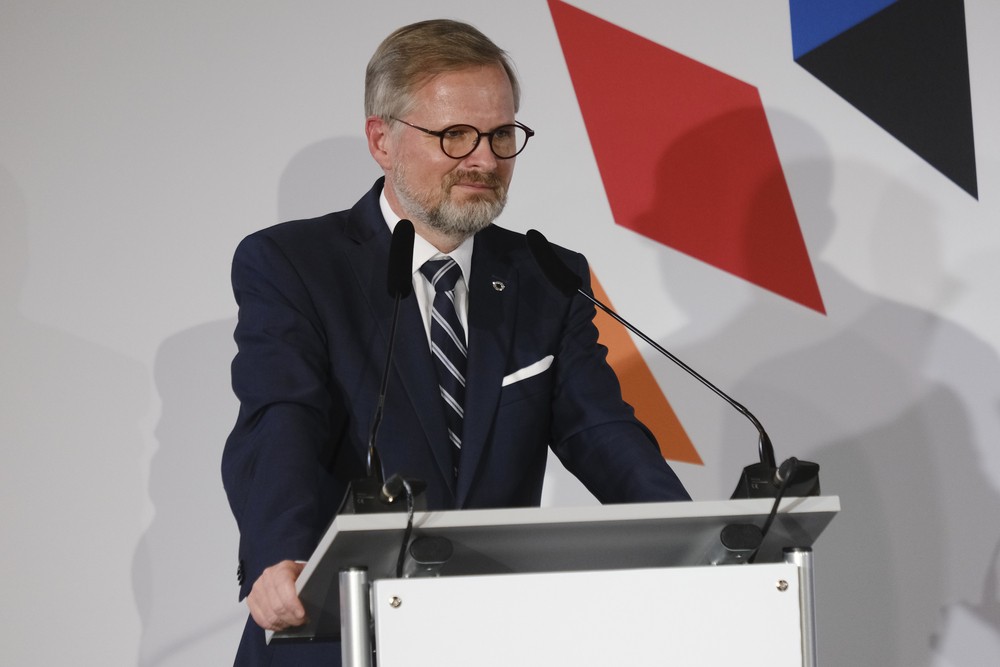Prime Minister Petr Fiala (ODS) has expressed his belief in fostering even closer cooperation between the Czech Republic and Slovakia. He extended his well-wishes to the Slovaks, hoping that their post-election negotiations will lead to the formation of an effective government. Fiala shared his thoughts on the outcome of the Slovak parliamentary elections via the social network X. Additionally, leaders of the five-coalition have also conveyed their desire to maintain the existing above-average relations with the future Slovak government.
“I closely followed the results of the Slovak elections, and I extend my best wishes to the Slovaks for successful post-election negotiations that result in the formation of a capable government. I am confident that we will continue our close cooperation at the governmental level for the mutual benefit of our countries,” Fiala stated. He underscored the historical ties, geographical proximity, and friendly relations that link the Czech Republic and Slovakia.
In the recent Slovak elections, Robert Fico’s Smer-Social Democracy (Smer-SD) emerged victorious, with Progressive Slovakia (PS) led by Michal Šimečka coming in second and Peter Pellegrini’s Voice-SD securing third place.
President Petr Pavel emphasized the importance of respecting the will of the citizens and expressed the Czech Republic’s interest in maintaining exceptional relations with Slovakia.
Deputy Prime Minister and leader of the People’s Party, Marian Jurečka, expressed his hope that Slovakia will succeed in forming a government committed to a pro-Western and pro-democratic path.
Jurečka welcomed the results of the Slovak People’s Party, which is set to return to the Slovak National Council. Similar sentiments were echoed by People’s Party ministers for agriculture, Marek Výborný, and the environment, Petr Hladík. Jurečka fervently wished for Slovakia to establish a government that upholds the country’s pro-Western and pro-democratic orientation while remaining a reliable partner and ally.
Deputy Prime Minister Ivan Bartoš (Pirates) expressed confidence in the future Slovak cabinet’s ability to continue the above-average cooperation between the Czech Republic and Slovakia.
Bartoš highlighted the common history and European future shared by both countries, considering their geographical proximity as an advantage that should be further developed. He expressed optimism that the future Slovak government would uphold the current high level of cooperation with the Czech Republic.
Deputy Prime Minister Vít Rakušan (STAN) viewed the results of the Slovak elections as a lesson for the Czech Republic as well. He emphasized the need to communicate the benefits of liberal democracy to those on the periphery or those who may be disillusioned.
Rakušan regarded the Slovak election results as a “warning and a lesson” for the Czech Republic, emphasizing the importance of addressing the concerns of people living on the periphery, the economically disadvantaged, and the disillusioned. He stressed the need to create a society resilient to fear.
Markéta Pekarová Adamová, head of TOP 09 and speaker of the lower house, also expressed her desire for the formation of a government in Slovakia with a Euro-Atlantic orientation, capable of calming the polarized society.
Pekarová Adamová noted that the relations between the Czech Republic and Slovakia remain exceptional even after the dissolution of the common state. She expressed confidence that these strong ties will persist. Her wish is for Slovakia to establish a government that aligns with the Euro-Atlantic direction of its foreign policy and contributes to societal harmony.
Regarding statements made by Robert Fico about ending military aid to Ukraine, Pekarová Adamová advised against making premature judgments. She emphasized the importance of considering the positions of all parties that may form a government and suggested that Progressive Slovakia (PS) has a numerical chance of participating in a coalition government alongside Smer-SD.
Pekarová Adamová also pointed out the lessons to be learned from the Slovak elections, highlighting the impediment posed by the fragmentation of the political landscape, particularly within the democratic spectrum. She stressed that this fragmentation can hinder electoral success and the opportunities for governance for those with a clear pro-Western orientation.
Source: novinky.cz


















